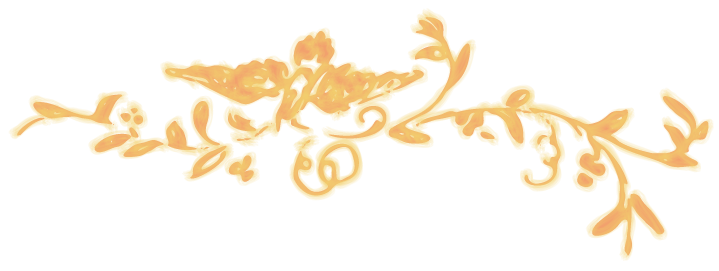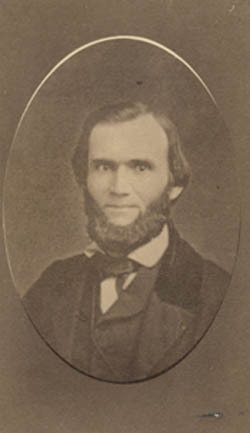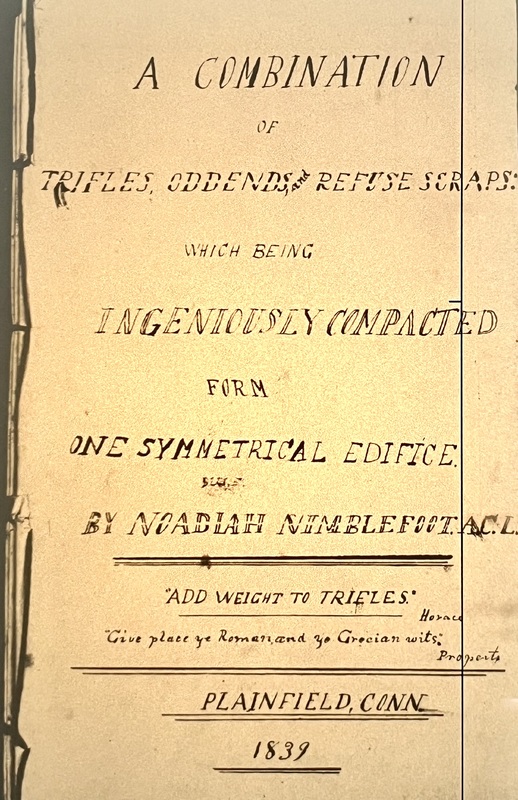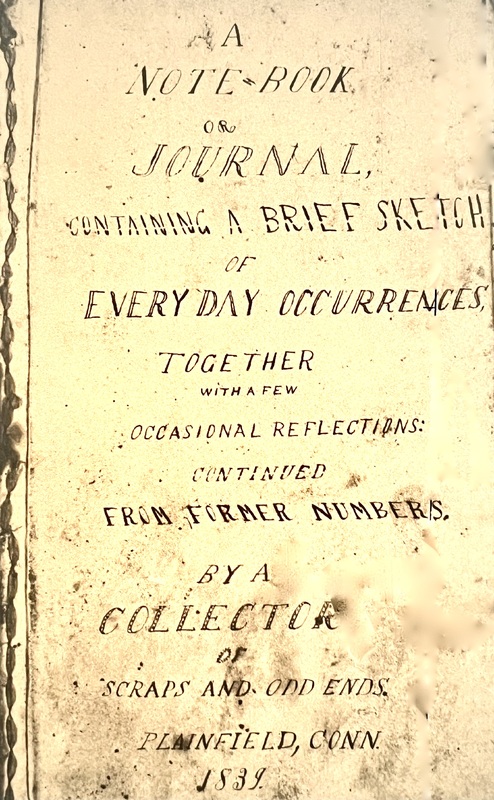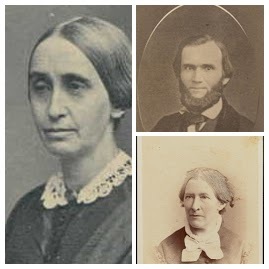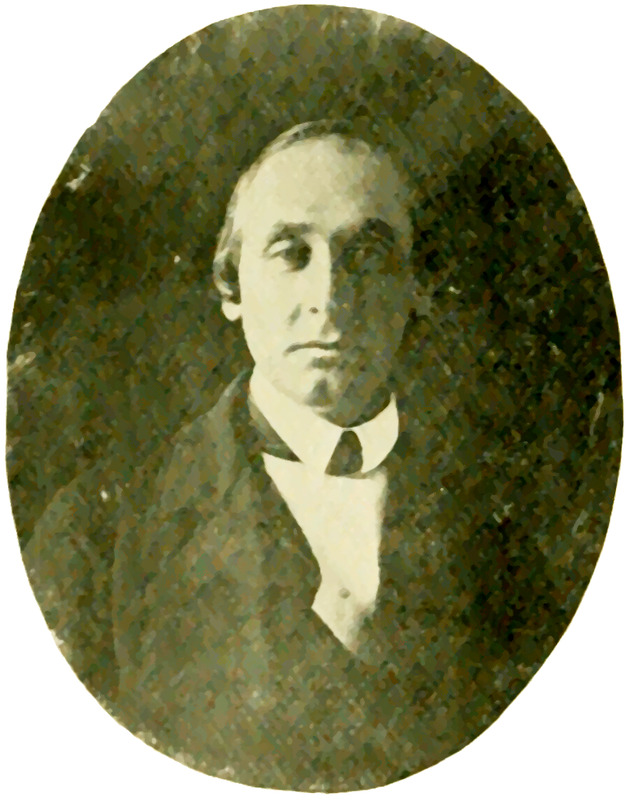Cyrus Moses Burleigh: Quick-Witted Activist
Cyrus Moses Burleigh Basics
b. February 8, 1820, Plainfield, Connecticut
d. March 7, 1855, Sunnyside, Pennsylvania
m. Margaret Jones (1817-1891), February 3, 1855, Philadelphia, Pennsylvania
lived in Connecticut, Pennsylvania, and briefly in Rhode Island and Massachusetts
The "Mirthful" Cyrus Moses Burleigh
Cyrus Moses Burleigh, the next-to-youngest of the siblings, is quite winsome in his writing. But his writing is hard to find, being mainly in journals, letters, and reports from the struggle. When you find them, though, his words sparkle with life and humor. This helps to explain why he was so beloved, and mourned so extravagantly at the time of his early death.
He contributed extensively to both temperance and anti-slavery in Connecticut, Rhode Island and Massachusetts. He worked as an agent for the American Anti-Slavery Society in the 1840s. But it was when he followed his brother Charles to Pennsylvania that he really blossomed. He found Quaker culture to be quite congenial, though there is no evidence that he joined the Society of Friends.
Cyrus Moses Burleigh became part of the editorial board of the Pennsylvania Freeman, engaged with William Still and the Underground Railroad, and reported on the Christiana resistance of September 11, 1851. He was mobbed as a speaker due to his opposition to the Fugitive Slave Law.
One of the most intriguing moments in his life came at the end of it, when he married his good friend Margaret Jones, who was in a committed relationship with Mary Grew. The marriage gave Margaret the prestige of the Burleigh family connection, and helped to bring Cyrus's worldly affairs to an orderly conclusion. But it is unlikely that this was a "marriage" in any romantic or sexual sense.
The Journals of Cyrus Moses Burleigh
Cyrus's hand-written journals, which run from July of 1837 to March 1845, constitute a treasure-trove of information about him, his family, daily life in Windham county, and his increasing involvement in reform causes. This website will, eventually, make a full transcription of all the journals available. Among the famed people noted in it, in addition to the Burleigh family, are Prudence Crandall, Almira Crandall, William Lloyd Garrison, Wendell Phillips, Elijah Lovejoy, and many more. A full index of these names will be included with their internal references in this project once the transcription is complete.
Cyrus's journals are frank, unsparing (of himself and others), often humorous, and, when transcribed, will be of interest to a wide range of scholars.
The first two volumes of the diary are in the John Hay Library at Brown University, but easier access comes from a microfilm with the following catalogue information: Micropublished in "American Poetry, 1650-1900: Part II." No. 352. New Haven, Connecticut: Research Publications, 1975. This same collection includes a collection of hand-written juvenalia by his brother George Shepard Burleigh. The third volume of Cyrus's journal is found at the Historical Society of Pennsylvania, where it was misattributed to Charles for many years (see note below). Together these journals provide a precious look at the daily life, activity, and thought of a young man deeply involved in reform movements.
The Young Adulthood of Cyrus Moses Burleigh
Cyrus's journals - the earliest of which starts when he was seventeen - reveal a tight-knit group of friends in Plainfield, with names familiar from the Abolitionist movement in the area, most notably James Monroe (sometimes spelled Munro) and the Hinckley family. The diary reveals that Cyrus taught, and attended schools simultaneously, including Plainfield Academy and a writing school run by a Mr. Goodell. He also showed early talent canvassing for signatures on petitions. He faithfully (pun intended) recorded the theme of every sermon given by Plainfield's Congregational minister, Mr. Rockwell.
Farming activities were recorded on most days. Winnowing, husking, reaping, planting, storing, and repairing equipment and buildings are among the activities in which Cyrus participated. Trips to the local stores, meeting houses, and post office are also noted on many days. But the regular camaraderie of family and friends dominates the first volume of the journal.
One of the more intriguing activities recorded in the journal covers the Debate Society, of which Cyrus was an active part. The topics discussed on most days, and the resulting winners and losers, are recorded.
The ongoing contact of the Burleigh family with the Crandall family in Canterbury is well-documented, including the sad events around the death of Almira Crandall, Prudence Crandall's younger sister, and co-teacher with her, William and Mary Burleigh.
On his 18th birthday, February 28, 1838, Cyrus was in Hartford, Connecticut, at the inaugural meeting of the Connecticut Anti-Slavery Society. Quite the way to start one's adulthood. Of course, Cyrus's apprenticeship in activism had been extensive, with ample tutelage from his older siblings, particularly Charles and William.
References
The Charter Oak 1:1:1-2 (March 1838)
First Phase of Movement Work by Cyrus Moses Burleigh
In his journal, Cyrus reports that George W. Benson recruited him in April 1839 to canvas for a new publication, The Cradle of Liberty, that would highlight the best anti-slavery material from The Liberator. Having obtained his father's permission, Cyrus headed up to Massachusetts and commenced the work. He met with some success - and some opposition from both anti-Garrisonian abolitionists and from anti-abolitionists - as he trekked around southern Worcester county in May of 1839.
Universal Grief
Cyrus Moses Burleigh's death at such a young age was deeply mourned in the Abolitionist community, equally apparent in publications based in Boston and Philadelphia. One of the most outstanding contributions to this outpouring of grief was a sonnet by William Lloyd Garrison himself, in the pages of The Liberator. It is also interesting that this sonnet reflects Garrison's growing belief in Spiritualism:
Sonnet, “To The Memory of Cyrus M. Burleigh”
Absent, not lost—removed from earth, not dead—
Existent still, but in a higher sphere:—
What though from us thy mortal form has fled?
Where’er thou are, as when incarnate here,
If Right is struggling ‘gainst a hostile throng,
If Justice needs a champion bold and true,
Thou wilt be foremost to redress the wrong,
And all the powers of darkness to subdue.
Though Early summoned to the spirit-land,
Thy earthly life, by noble words and deeds,
Was long-extended:—heart, and voice, and hand,
Thou gav’st to Freedom in her direst needs.
Oh, for thy zeal to free the fettered slave,
Forever hallowed by thy lowly grave!Boston, April 2, 1855. W.L.G.
Cyrus's own death bed farewell was widely shared in the Abolitionist press. This particular setting comes with a strong introduction from the editor:
“The Retrospect of a Noble Life”
“We give below an extract from the dying injunction of a noble champion of freedom. CYRUS BURLEIGH, dedicated to the Executive Committee of the Anti-Slavery Society that employed him for so many years to lecture and do the duties of an editor. Mr. Burleigh passed to his reward a few weeks since a victim to the fatal disease—consumption.Let those who have libeled their natures by fighting the principles to which he has adhered with unwavering trust, see in the calm confidence he exhibits that he has been faithful to known duty, that there is a noble reliance on truth in such men, that nerves them on dispute of all opposition. How few of those who have infamously distinguished themselves by efforts to perpetuate the reign of Despotism in this land, can thus come to a death bed, strong in the faith that the principles they have acted upon, are destined to live and triumph, because they are true. Let the man burning with an ambition to write his name were coming generations shall gaze upon it with admiration, consecrate himself to the mightiest work of this century—the Abolition os slavery.
“Tell the executive Committee that my intercourse and long association and co-operation with them has been a source of great pleasure and profit to myself. Our personal friendship, which has sprung out of this, has been very gratifying to me; but, what is far better, is, our mutual interest in the great cause, which has been so blessed to our souls. Tell them that, as I stand in the near prospect of death, and look back upon life, there is nothing that I regard with more unfeigned satisfaction than the devotion of so large a portion of my days and strength to the anti-slavery cause. I feel that in thus devoting myself to the service of my fellow men, I have been doing the truest service to my God; I feel that I have thus proved by my life my faith in those eternal principles taught by Jesus Christ, and embodied in his life, which are alike efficacious for the personal salvation of the soul, and the redemption of the world from sin. There is no part of the time which I have given to the anti-slavery cause, which I remember with more pleasure than that in which I had been associated with them in my labors; while that intercourse has given me cordial respect and love for them, it has given me much satisfaction in a sense of the confidence which they have reposed in me. Tell them that in my weakness and helplessness, I have the same love for that cause and confidence in its fundamental principles, which I had in the days of my strength, when I could serve it better.”
References
William Lloyd Garrison, “Sonnet” 6 April 1855, p. 55
“The Retrospect of a Noble Life,” The Western Freeman (Fond du Lac, Wisconsin), April 25, 1855, p. 2.
Source of Confusion - C.C. v. C.M.!
Cyrus has been a cipher in the historical record, and, due to their propensity to use their initials, he has been oft-confused with his brother Charles - C.M. Burleigh is Cyrus Moses, while C.C. Burleigh is Charles Calistus. But many scholars are unaware of Cyrus's existence (or are unaware of his middle name), and this has led to some misattributions. By providing transcriptions of his journals, and a timeline of his activities, this site hopes to be a clearinghouse for future scholars to avoid such errors, and understand these two brothers as deeply aligned with each other, yet quite separate personalities.


